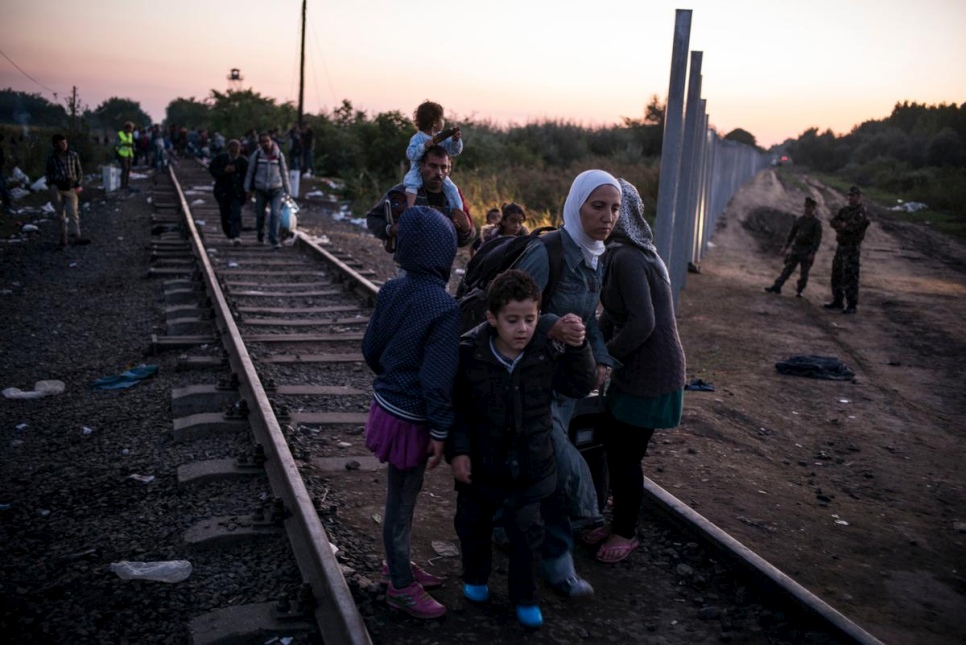UN Summit seeks enhanced refugee, migrant protection
19 September 2016
UN General Assembly Summit Addressing Large Movements of Refugees and Migrants is set to adopt key commitments to safeguard those on the move.
 NEW YORK – A high-level UN summit to address large movements of refugees and migrants meets in New York today, seeking to enhance protection for those forcibly displaced and otherwise on the move.
NEW YORK – A high-level UN summit to address large movements of refugees and migrants meets in New York today, seeking to enhance protection for those forcibly displaced and otherwise on the move.
The UN Summit on Addressing Large Movements of Refugees and Migrants will be held at the General Assembly. It brings together heads of state and government, Ministers and leaders from the UN System and representatives of civil society, among others.
The gathering will have two pillars – addressing the plight of refugees who are unable to return home because of conflict and persecution, and others migrating for a complex range of reasons. It seeks to adopt key commitments among member states to enhance the safety and security of both, in a global context in which both refugees and migrants are often forced into the hands of traffickers and smugglers, and face hostility and xenophobia in countries of transit and destination.
“This summit marks a recognition at the highest levels that the international response to refugee crises is simply not adequate, with enormous consequences for refugees, and the states and communities hosting them,” said UN High Commissioner for Refugees Filippo Grandi, who will address the opening plenary on Monday.
“This summit marks a recognition at the highest levels that the international response to refugee crises is simply not adequate.”
“It marks a pivotal opportunity to bring about real change, based first and foremost on international cooperation and solidarity,” he added.
The commitments were agreed on August 2. Once adopted at the Summit – which is to be livecast starting 08:30 New York (12:30 GMT) – they will be known as the New York Declaration, and contain annexes on refugees and migrants that will serve as the basis for future compacts. UNHCR, the UN Refugee Agency, believes the Declaration will mark a significant milestone in refugee and migrant protection.
In it, States declare profound solidarity for people who are forced to flee their homes; reaffirm their obligations to full respect of the human rights of refugees and migrants and pledge robust support to those countries affected by large movements of refugees and migrants.
The Declaration includes commitments common to refugees and migrants, including: combating exploitation, racism and xenophobia, savings lives en route, as well as ensuring border procedures follow due process and are in line with international law.
It also addresses the needs of women, children and those with health care needs, recognizing and facilitating the positive contributions of migrants and refugees, ensuring they are part of development priorities, and ensuring adequate, flexible and predictable funding.
“It marks a pivotal opportunity to bring about real change, based first and foremost on international cooperation and solidarity.”
The specific commitments for refugees include increasing support to the countries and communities hosting the largest numbers. There are related commitments to boosting early childhood and primary and secondary education for refugees, and creating jobs and income generation schemes for refugees and host communities.
There is also an emphasis on expanding opportunities for resettlement or other forms of admission to third countries.
The New York Declaration is a reaffirmation of the importance and application of the international protection regime — the 1951 Refugee Convention, human rights and humanitarian law – at a time when there are record levels of forced displacement.
Governments specifically acknowledge that the protection of refugees and assistance to host states is a shared international responsibility, and not to be borne by host countries alone.
UNHCR also very much welcomes the Leaders’ Summit on the Global Refugee Crisis on September 20. Convened by President Barack Obama, it provides an opportunity for governments to make concrete commitments in funding to humanitarian appeals and international organizations, to admitting more refugees through resettlement and other pathways, and increasing refugees’ self-reliance and inclusion through work and education opportunities.
Refugees cross the border into Hungary from Serbia in this September 2015 file photo. © UNHCR/Olivier Laban-Mattei







